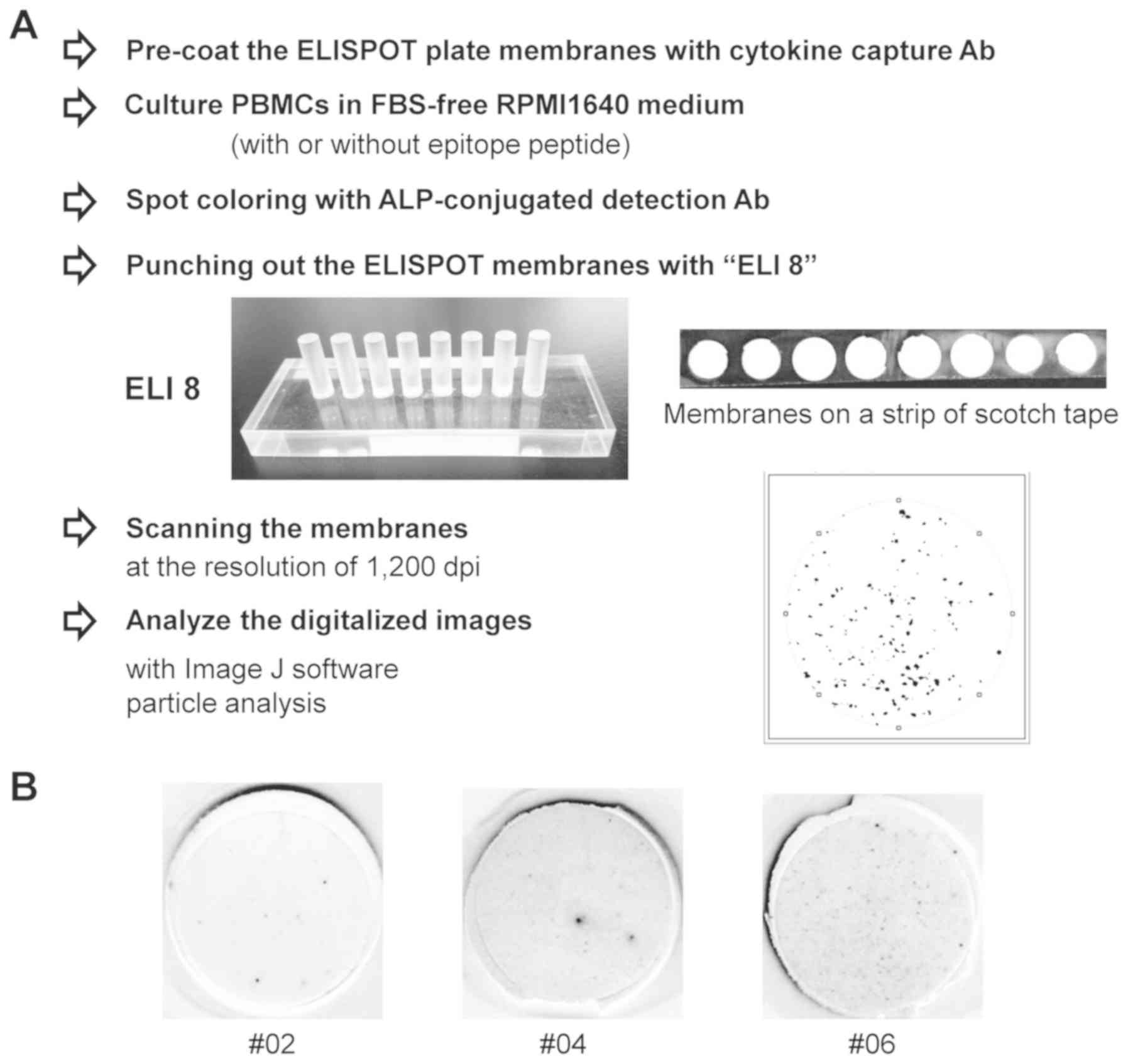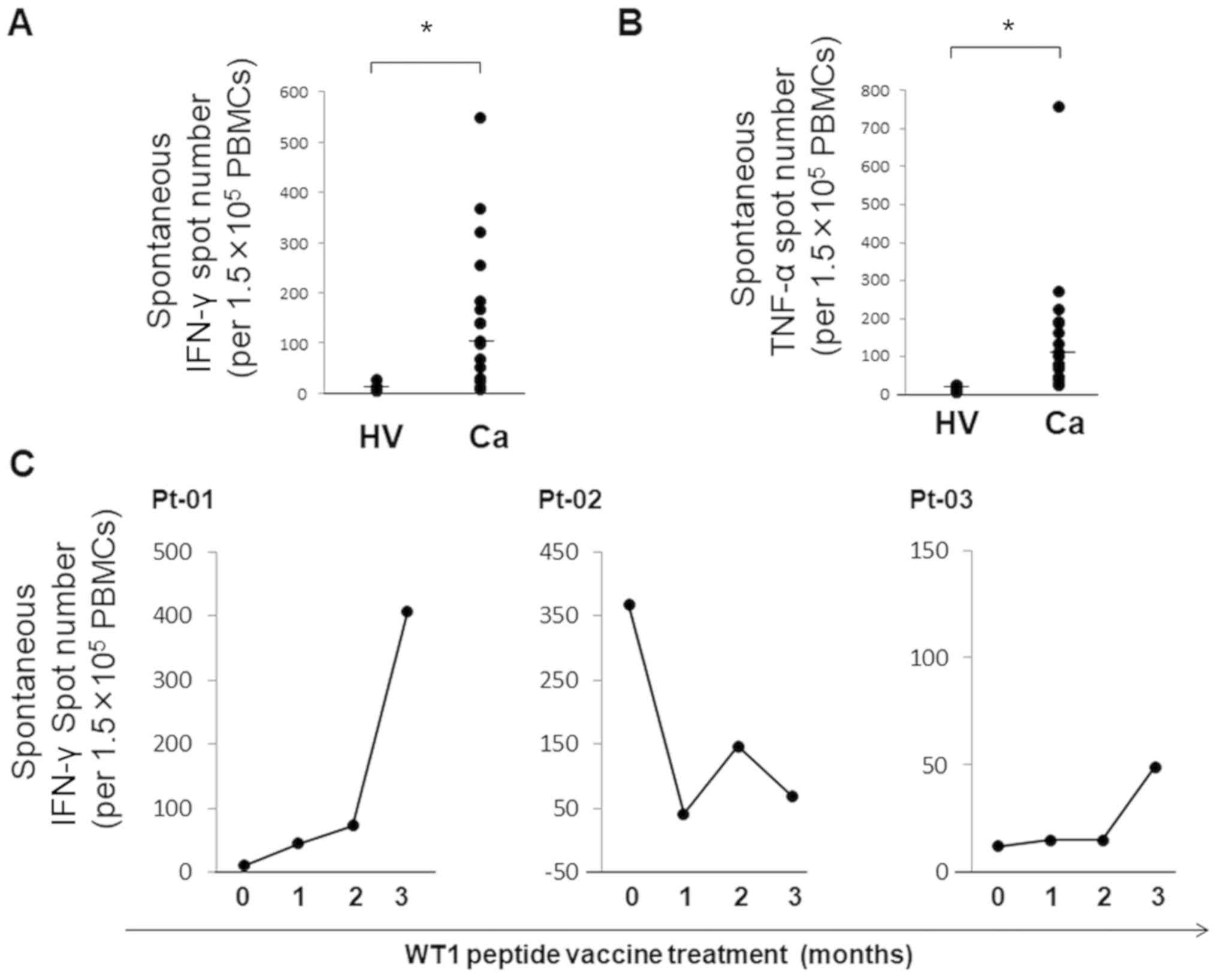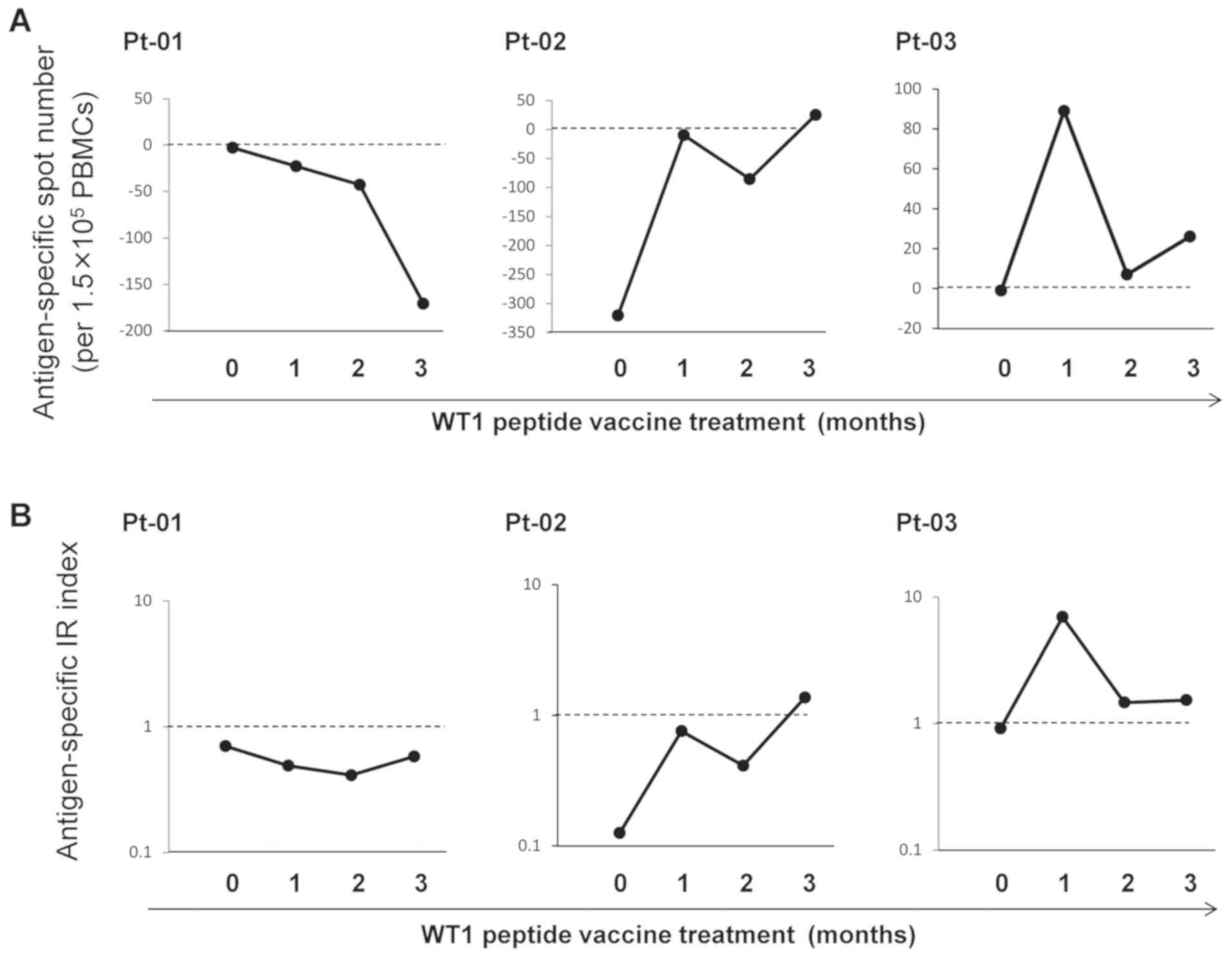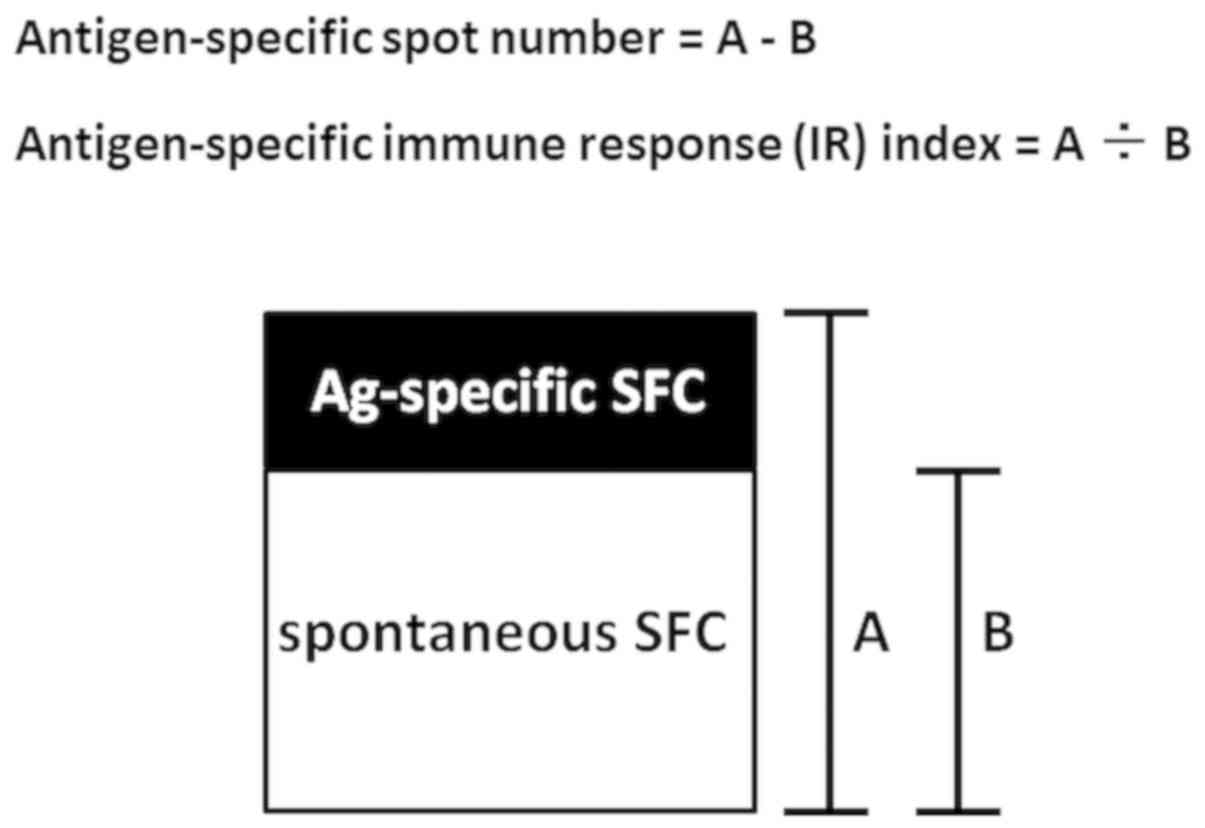|
1
|
Hamid O, Robert C, Daud A, Hodi FS, Hwu
WJ, Kefford R, Wolchok JD, Hersey P, Joseph RW, Weber JS, et al:
Safety and tumor responses with lambrolizumab (anti-PD-1) in
melanoma. N Engl J Med. 369:134–144. 2013.PubMed/NCBI View Article : Google Scholar
|
|
2
|
Brahmer J, Reckamp KL, Baas P, Crinò L,
Eberhardt WE, Poddubskaya E, Antonia S, Pluzanski A, Vokes EE,
Holgado E, et al: Nivolumab versus docetaxel in advanced
squamous-cell non-small-cell lung cancer. N Engl J Med.
373:123–135. 2015.PubMed/NCBI View Article : Google Scholar
|
|
3
|
Carbone DP, Reck M, Paz-Ares L, Creelan B,
Horn L, Steins M, Felip E, van den Heuvel MM, Ciuleanu TE, Badin F,
et al: First-line nivolumab in stage IV or recurrent non-small-cell
lung cancer. N Engl J Med. 376:2415–2426. 2017.PubMed/NCBI View Article : Google Scholar
|
|
4
|
Togasaki K, Sukawa Y, Kanai T and Takaishi
H: Clinical efficacy of immune checkpoint inhibitors in the
treatment of unresectable advanced or recurrent gastric cancer: An
evidence-based review of therapies. Onco Targets Ther.
11:8239–8250. 2018.PubMed/NCBI View Article : Google Scholar
|
|
5
|
Kelly RJ: Immunotherapy for esophageal and
gastric cancer. Am Soc Clin Oncol Educ Book. 37:292–300.
2017.PubMed/NCBI View Article : Google Scholar
|
|
6
|
Forde PM, Scherpereel A and Tsao AS: Use
of immune checkpoint inhibitors in mesothelioma. Curr Treat Options
Oncol. 20(18)2019.PubMed/NCBI View Article : Google Scholar
|
|
7
|
Matsuki E and Younes A: Checkpoint
inhibitors and other immune therapies for hodgkin and non-hodgkin
lymphoma. Curr Treat Options Oncol. 17(31)2016.PubMed/NCBI View Article : Google Scholar
|
|
8
|
Addeo A, Banna GL, Metro G and Di Maio M:
Chemotherapy in combination with immune checkpoint inhibitors for
the first-line treatment of patients with advanced non-small cell
lung cancer: A systematic review and literature-based
meta-analysis. Front Oncol. 9(264)2019.PubMed/NCBI View Article : Google Scholar
|
|
9
|
Gamerith G, Kocher F, Rudzki J and Pircher
A: ASCO. 2018 NSCLC highlights-combination therapy is key. Memo.
11:266–271. 2018.PubMed/NCBI View Article : Google Scholar
|
|
10
|
Tran T, Blanc C, Granier C, Saldmann A,
Tanchot C and Tartour E: Therapeutic cancer vaccine: Building the
future from lessons of the past. Semin Immunopathol. 41:69–85.
2019.PubMed/NCBI View Article : Google Scholar
|
|
11
|
Hu Z, Ott PA and Wu CJ: Towards
personalized, tumour-specific, therapeutic vaccines for cancer. Nat
Rev Immunol. 18:168–182. 2018.PubMed/NCBI View Article : Google Scholar
|
|
12
|
Lamano JB, Ampie L, Choy W, Kesavabhotla
K, DiDomenico JD, Oyon DE, Parsa AT and Bloch O: Immunomonitoring
in glioma immunotherapy: Current status and future perspectives. J
Neurooncol. 127:1–13. 2016.PubMed/NCBI View Article : Google Scholar
|
|
13
|
Ogunjimi B, Smits E, Hens N, Hens A,
Lenders K, Ieven M, Van Tendeloo V, Van Damme P and Beutels P:
Exploring the impact of exposure to primary varicella in children
on varicella-zoster virus immunity of parents. Viral Immunol.
24:151–157. 2011.PubMed/NCBI View Article : Google Scholar
|
|
14
|
Blume J, Kostler J and Weissert R: Benefit
of ELISpot in early diagnosis of tuberculous meningoencephalitis:
Case report and literature review. eNeurologicalSci. 1:51–53.
2015.PubMed/NCBI View Article : Google Scholar
|
|
15
|
Butterfield LH: The society for
immunotherapy of cancer biomarkers task force recommendations
review. Semin Cancer Biol. 52:12–15. 2018.PubMed/NCBI View Article : Google Scholar
|
|
16
|
Smith SG, Harris SA, Satti I, Bryan D,
Walker KB, Dockrell HM, McShane H and Ho MM: Assay optimisation and
technology transfer for multi-site immuno-monitoring in vaccine
trials. PLoS One. 12(e0184391)2017.PubMed/NCBI View Article : Google Scholar
|
|
17
|
Scheibenbogen C, Romero P, Rivoltini L,
Herr W, Schmittel A, Cerottini JC, Woelfel T, Eggermont AM and
Keilholz U: Quantitation of antigen-reactive T cells in peripheral
blood by IFNgamma-ELISPOT assay and chromium-release assay: A
four-centre comparative trial. J Immunol Methods. 244:81–89.
2000.PubMed/NCBI View Article : Google Scholar
|
|
18
|
Call KM, Glaser T, Ito CY, Buckler AJ,
Pelletier J, Haber DA, Rose EA, Kral A, Yeger H and Lewis WH:
Isolation and characterization of a zinc finger polypeptide gene at
the human chromosome 11 Wilms' tumor locus. Cell. 60:509–520.
1990.PubMed/NCBI View Article : Google Scholar
|
|
19
|
Inoue K, Sugiyama H, Ogawa H, Nakagawa M,
Yamagami T, Miwa H, Kita K, Hiraoka A, Masaoka T and Nasu K: WT1 as
a new prognostic factor and a new marker for the detection of
minimal residual disease in acute leukemia. Blood. 84:3071–3079.
1994.PubMed/NCBI
|
|
20
|
Inoue K, Tamaki H, Ogawa H, Oka Y, Soma T,
Tatekawa T, Oji Y, Tsuboi A, Kim EH, Kawakami M, et al: Wilms'
tumor gene (WT1) competes with differentiation-inducing signal in
hematopoietic progenitor cells. Blood. 91:2969–2976.
1998.PubMed/NCBI
|
|
21
|
Ito K, Oji Y, Tatsumi N, Shimizu S, Kanai
Y, Nakazawa T, Asada M, Jomgeow T, Aoyagi S, Nakano Y, et al:
Antiapoptotic function of 17AA(+)WT1 (Wilms' tumor gene) isoforms
on the intrinsic apoptosis pathway. Oncogene. 25:4217–4229.
2006.PubMed/NCBI View Article : Google Scholar
|
|
22
|
Algar EM, Khromykh T, Smith SI, Blackburn
DM, Bryson GJ and Smith PJ: A WT1 antisense oligonucleotide
inhibits proliferation and induces apoptosis in myeloid leukaemia
cell lines. Oncogene. 12:1005–1014. 1996.PubMed/NCBI
|
|
23
|
Oji Y, Miyoshi S, Maeda H, Hayashi S,
Tamaki H, Nakatsuka S, Yao M, Takahashi E, Nakano Y, Hirabayashi H,
et al: Overexpression of the Wilms' tumor gene WT1 in de novo lung
cancers. Int J Cancer. 100:297–303. 2002.PubMed/NCBI View Article : Google Scholar
|
|
24
|
Oji Y, Suzuki T, Nakano Y, Maruno M,
Nakatsuka S, Jomgeow T, Abeno S, Tatsumi N, Yokota A, Aoyagi S, et
al: Overexpression of the Wilms' tumor gene W T1 in primary
astrocytic tumors. Cancer Sci. 95:822–827. 2004.PubMed/NCBI View Article : Google Scholar
|
|
25
|
Kanai T, Ito Z, Oji Y, Suka M, Nishida S,
Takakura K, Kajihara M, Saruta M, Fujioka S, Misawa T, et al:
Prognostic significance of Wilms' tumor 1 expression in patients
with pancreatic ductal adenocarcinoma. Oncol Lett. 16:2682–2692.
2018.PubMed/NCBI View Article : Google Scholar
|
|
26
|
Jomgeow T, Oji Y, Tsuji N, Ikeda Y, Ito K,
Tsuda A, Nakazawa T, Tatsumi N, Sakaguchi N, Takashima S, et al:
Wilms' tumor gene WT1 17AA(-)/KTS(-) isoform induces morphological
changes and promotes cell migration and invasion in vitro. Cancer
Sci. 97:259–270. 2006.PubMed/NCBI View Article : Google Scholar
|
|
27
|
Tatsumi N, Oji Y, Tsuji N, Tsuda A,
Higashio M, Aoyagi S, Fukuda I, Ito K, Nakamura J, Takashima S, et
al: Wilms' tumor gene WT1-shRNA as a potent apoptosis-inducing
agent for solid tumors. Int J Oncol. 32:701–711. 2008.PubMed/NCBI
|
|
28
|
Wagner KD, Wagner N, Wellmann S, Schley G,
Bondke A, Theres H and Scholz H: Oxygen-regulated expression of the
Wilms' tumor suppressor Wt1 involves hypoxia-inducible factor-1
(HIF-1). FASEB J. 17:1364–1366. 2003.PubMed/NCBI View Article : Google Scholar
|
|
29
|
Oka Y, Udaka K, Tsuboi A, Elisseeva OA,
Ogawa H, Aozasa K, Kishimoto T and Sugiyama H: Cancer Immunotherapy
targeting Wilms' tumor gene WT1 product. J Immunol. 164:1873–1880.
2000.PubMed/NCBI View Article : Google Scholar
|
|
30
|
Gao L, Bellantuono I, Elsässer A, Marley
SB, Gordon MY, Goldman JM and Stauss HJ: Selective elimination of
leukemic CD34(+) progenitor cells by cytotoxic T lymphocytes
specific for WT1. Blood. 95:2198–2203. 2000.PubMed/NCBI
|
|
31
|
Oka Y, Tsuboi A, Taguchi T, Osaki T, Kyo
T, Nakajima H, Elisseeva OA, Oji Y, Kawakami M, Ikegame K, et al:
Induction of WT1 (Wilms' tumor gene)-specific cytotoxic T
lymphocytes by WT1 peptide vaccine and the resultant cancer
regression. Proc Natl Acad Sci USA. 101:13885–13890.
2004.PubMed/NCBI View Article : Google Scholar
|
|
32
|
Tawara I, Kageyama S, Miyahara Y, Fujiwara
H, Nishida T, Akatsuka Y, Ikeda H, Tanimoto K, Terakura S, Murata
M, et al: Safety and persistence of WT1-specific T-cell receptor
gene-transduced lymphocytes in patients with AML and MDS. Blood.
130:1985–1994. 2017.PubMed/NCBI View Article : Google Scholar
|
|
33
|
Keilholz U, Letsch A, Busse A, Asemissen
AM, Bauer S, Blau IW, Hofmann WK, Uharek L, Thiel E and
Scheibenbogen C: A clinical and immunologic phase 2 trial of Wilms
tumor gene product 1 (WT1) peptide vaccination in patients with AML
and MDS. Blood. 113:6541–6548. 2009.PubMed/NCBI View Article : Google Scholar
|
|
34
|
Anguille S, Van de Velde AL, Smits EL, Van
Tendeloo VF, Juliusson G, Cools N, Nijs G, Stein B, Lion E, Van
Driessche A, et al: Dendritic cell vaccination as postremission
treatment to prevent or delay relapse in acute myeloid leukemia.
Blood. 130:1713–1721. 2017.PubMed/NCBI View Article : Google Scholar
|
|
35
|
Van Tendeloo VF, Van de Velde A, Van
Driessche A, Cools N, Anguille S, Ladell K, Gostick E, Vermeulen K,
Pieters K, Nijs G, et al: Induction of complete and molecular
remissions in acute myeloid leukemia by Wilms' tumor 1
antigen-targeted dendritic cell vaccination. Proc Natl Acad Sci
USA. 107:13824–13829. 2010.PubMed/NCBI View Article : Google Scholar
|
|
36
|
Oji Y, Oka Y, Nishida S, Tsuboi A,
Kawakami M, Shirakata T, Takahashi K, Murao A, Nakajima H, Narita
M, et al: WT1 peptide vaccine induces reduction in minimal residual
disease in an imatinib-treated CML patient. Eur J Haematol.
85:358–360. 2010.PubMed/NCBI View Article : Google Scholar
|
|
37
|
Nishida S, Ishikawa T, Egawa S, Koido S,
Yanagimoto H, Ishii J, Kanno Y, Kokura S, Yasuda H, Oba MS, et al:
Combination gemcitabine and WT1 peptide vaccination improves
progression-free survival in advanced pancreatic ductal
adenocarcinoma: A phase II randomized study. Cancer Immunol Res.
6:320–331. 2018.PubMed/NCBI View Article : Google Scholar
|
|
38
|
Oji Y, Inoue M, Takeda Y, Hosen N,
Shintani Y, Kawakami M, Harada T, Murakami Y, Iwai M, Fukuda M, et
al: WT1 peptide-based immunotherapy for advanced thymic epithelial
malignancies. Int J Cancer. 142:2375–2382. 2018.PubMed/NCBI View Article : Google Scholar
|
|
39
|
Zauderer MG, Tsao AS, Dao T, Panageas K,
Lai WV, Rimner A, Rusch VW, Adusumilli PS, Ginsberg MS, Gomez D, et
al: A randomized phase ii trial of adjuvant galinpepimut-S, WT-1
analogue peptide vaccine, after multimodality therapy for patients
with malignant pleural mesothelioma. Clin Cancer Res. 23:7483–7489.
2017.PubMed/NCBI View Article : Google Scholar
|
|
40
|
Oji Y, Hashimoto N, Tsuboi A, Murakami Y,
Iwai M, Kagawa N, Chiba Y, Izumoto S, Elisseeva O, Ichinohasama R,
et al: Association of WT1 IgG antibody against WT1 peptide with
prolonged survival in glioblastoma multiforme patients vaccinated
with WT1 peptide. Int J Cancer. 139:1391–1401. 2016.PubMed/NCBI View Article : Google Scholar
|
|
41
|
Cox MC, Castiello L, Mattei M, Santodonato
L, D'Agostino G, Muraro E, Martorelli D, Lapenta C, Di Napoli A, Di
Landro F, et al: Clinical and antitumor immune responses in
relapsed/refractory follicular lymphoma patients after intranodal
injections of IFNα-dendritic cells and rituximab: A phase I
clinical tril. Clin Cancer Res. 25:5231–5241. 2019.PubMed/NCBI View Article : Google Scholar
|
|
42
|
Kalli KR, Block MS, Kasi PM, Erskine CL,
Hobday TJ, Dietz A, Padley D, Gustafson MP, Shreeder B,
Puglisi-Knutson D, et al: Folate receptor alpha peptide vaccine
generates immunity in breast and ovarian cancer patients. Clin
Cancer Res. 24:3014–3025. 2018.PubMed/NCBI View Article : Google Scholar
|


















